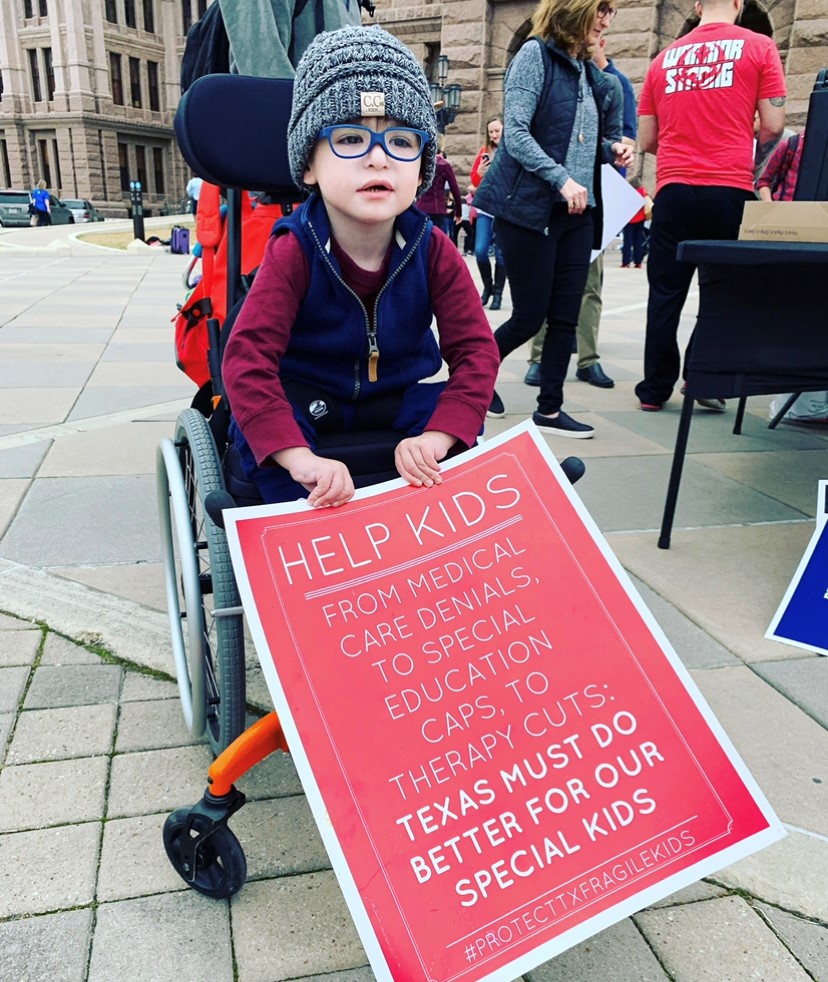
One mother’s fight to secure essential coverage for her son.
Four years ago, our son’s journey as a micro-preemie was shared by CNN and other news outlets. It was a story of hope and perseverance in a time of struggle. A happy ending to one of the hardest experiences a parent can face.
But the end of our NICU stay was just the beginning of Beckham’s story. Our 1 pound, 8 ounce baby is now a thriving five year old who still faces a litany of medical conditions. He has cerebral palsy and ataxia (impaired coordination), preventing him from being “safely” mobile, chronic lung disease, chronic kidney disease, and is non-verbal and unable to eat or drink by mouth. The list goes on. Every year, he continues to defy the odds and this year, our health care system is threatening to abandon him.
The goal of insurance companies is profit, not care. The people who run these “businesses” are not trained in medicine.
This morning we await a decision that could change the course of Beckham’s care, along with our family’s well-being. It’s a battle we face at the start of each year when our health care coverage renews. We recently changed providers, from Cigna to BCBS, as Cigna would no longer cover several of Beckham’s doctors and specialists. We were under the impression that our new provider would continue coverage of his in-home nursing care, an essential service due to the fact that he has a G button or feeding tube. We discovered that BCBS does, in fact, cover in-home nursing, just not for our child. Our claim was denied during the pre-authorization phase due to specifics in eligibility we had no one way of knowing prior to switching providers.
The goal of insurance companies is profit, not care. The people who run these “businesses” are not trained in medicine. They are trained in how best to make and save money. From our family alone, they make $25,000 a year – the approximate sum of our monthly fees, deductibles, out-of-network and out-of-pocket costs. Despite their lack of medical training, it is up to them to decide if my son qualifies for services. Nevermind the opinion of his doctor, who requested the coverage.
Beckham requires three therapies twice a week, each session lasting one hour. He is not old enough to attend public school, and daycares won’t accept him because he eats through a tube in his stomach. As he is non-verbal, it is imperative that he have caregivers who can communicate using sign language. Fifty-six hours a week of in-home nursing is the only thing that allows my husband and I to work. Having jobs allows us to qualify for medical coverage and earn enough money to the cover the out-of-pocket costs related to Beckham’s care. For us, working is essential.

Whenever Beckham’s doctors submit a request for coverage, the insurance company is given up to 60 days to review. You can bet they will always take the maximum amount of time to prevent having to pay for Beckham’s service during the grace period. After 60 days, our non-medically trained provider determined that a child having a G button qualifies only as custodial care and doesn’t require an in-home medical provider. The insurance company went above and beyond by also contacting the in-home nursing company we’ve used up to this point to inform them of the denial. The nursing company reassured me that while our service is no longer covered, we can continue to pay out-of-pocket for just $2000 a week.
I am a working mother of two, one with special needs, who now has to sit for hours a day trying to gather information about why the request was denied and what I can do to reverse the denial. All the while, I have no in-home care for my son. After several days, BCBS agreed to a peer-to-peer to review – a meeting with the original doctor who submitted the order and the person that decided the insurance company would not cover the service. A phone call, where the medically trained specialist that knows Beckham’s case inside out has to defend her diagnosis, treatment, and recommendation. Do you want to know why it takes so long to get in to see your doctor? This is why. They’re on the phone with an insurance company.
In the meantime, we looked into options in case we are denied a second time. Daycares do not accept children with G buttons. In the state of Texas where we live, kids ages three to five are eligible for early childhood programs, but they are only two to three hours a day and, ironically, require an RN to be on staff. There are no options for children under three years of age. Once a child is old enough to be eligible for public school, an Individualized Education Program (IEP) will be created to meet his needs and again, andRN will be required to be on staff. It seems every institution but the health insurance system considers a G button to be worthy of medical care.

Medicaid is an option for some, but not for us. While Beckham medically qualifies for the program, both my husband and I would have to quit our jobs to financially qualify. Even if I quit, as the primary breadwinner of our family, my husband’s teacher salary is considered too high. Only those living in extreme poverty are eligible for coverage.
This country puts so much value on life inside the womb, yet as soon as that fetus becomes a human being, she throws up her hands and says “not my problem.”
And then there are the infamous waiver programs — specialty programs created to ensure that all special needs children receive the care, treatment and supplies they need to thrive. Beckham does qualify, but the shortest waiting list for these programs is five years. We first applied when he was two. Children requiring early intervention therapies are far more likely to thrive and make progress the earlier they receive services. Due to budget restrictions in the state of Texas, the programs allow only a certain number of children to be added each year, resulting in a years-long backup. Beckham is on one list that is 15 years long.
So now we wait. And wonder if we will be forced to choose between our jobs and living in poverty to qualify for Medicare. We are just one of the millions of families who are suffering in America, and we are far better off than most special needs families. Many don’t have jobs with the benefits we have or the fight left in them to continue battling the health care system. Their children may never reach their full potential because America’s insurance companies refuse to let them try. This country puts so much value on life inside the womb, yet as soon as that fetus becomes a human being, she throws up her hands and says “not my problem.” We pride ourselves on the concept of “it takes a village, ” but a village does not exist for us. We have no support system. We are an island.

Maegan Sheiman is a mother of two, consulting manager and medical blogger. When she has spare time, she loves to write about her personal health experiences and her son's at thediaryofasickgirl.com. She lives in Texas with her husband Josh, daughter Bella, son Beckham, and their two dogs and pet bird.


